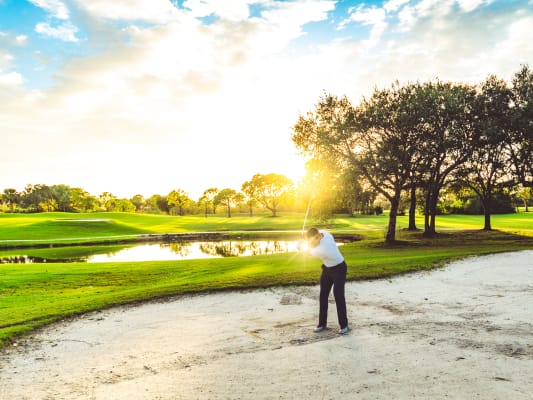Just Say Yes to Sunscreen!

As you head to your first hole, the sun is just starting to peek out from behind the clouds. You briefly wonder if you should apply sunscreen before you begin your round.
The answer is yes.
Applying sunscreen is an important way you can protect your skin. The sun’s rays can be harmful, affecting your skin, lips, ears and eyes. Golfers in particular are at risk for skin cancer because of extended sun exposure. That’s why it is so important to protect your body from the sun while playing golf and when participating in other outdoor activities.
Stressing the importance of sunscreen and regular skin checks on his social media platforms is PGA player Charley Hoffman, who came to Cromwell in June for the Travelers Championship. He recently underwent surgery for skin cancer.
“I do this post for no sympathy because I do what I love for a living but there are some risks involved in being out in the sun,” he said in an Instagram post.
To protect yourself against the sun, Middlesex Health medical providers say you should:
- Apply a broad spectrum sunscreen that is SPF 30 or higher and water resistant, and reapply at least every two hours.
- Seek shade whenever possible.
- Wear a hat, preferably one with a broad brim.
- Wear sun-protective clothing, specifically clothing that is labeled with an ultraviolet protection factor (UPF) rating of 30 or higher.
- Book an early tee time. When possible, it’s best to plan outdoor activities before 10 a.m. or after 2 p.m. to avoid the strongest sun exposure.
- Remember to apply lip balm with SPF 25 or higher.
- Wear polarized sunglasses that block UVA and UVB light. Remember that direct sunlight, along with light that reflects off of other things like grass, soil, dry sand and water, can damage your eyes.
Skin cancer can develop when skin is exposed to the sun, and it can affect anyone regardless of age, gender or skin tone. The best way to reduce your risk of getting skin cancer is by limiting or avoiding exposure to the sun. Checking your skin for changes in appearance throughout the year is also important because it can help catch any potential problems early, as is scheduling an annual appointment with a dermatologist. Your primary care provider can also help!
What to look for
Look for any pearly or waxy bumps and flat, flesh-colored or brown scar-like lesions. These can be signs of basal cell carcinoma. Firm, red nodules, or flat lesions with a scaly, crusted surface can indicate squamous cell carcinoma.
Signs of melanoma, the most dangerous skin cancer, include a change in the color, size or shape of a mole. Small lesions with irregular borders, or lesions that contain different colors may also be of concern.
To find a Middlesex Health medical provider, click here.
More Stories
Making a Difference One Golf Swing at a Time
June was a busy month for Middlesex Health. In addition to providing excellent care every day for patients, celebrating Pride Month and marking Juneteenth, the health system was at the golf course supporting the community!
Spotlight: Men’s Health
When it comes to health care concerns that disproportionately impact men, such as heart disease and cancer, there is good news despite the grim statistics. With the help of a health care provider, many diseases are preventable.